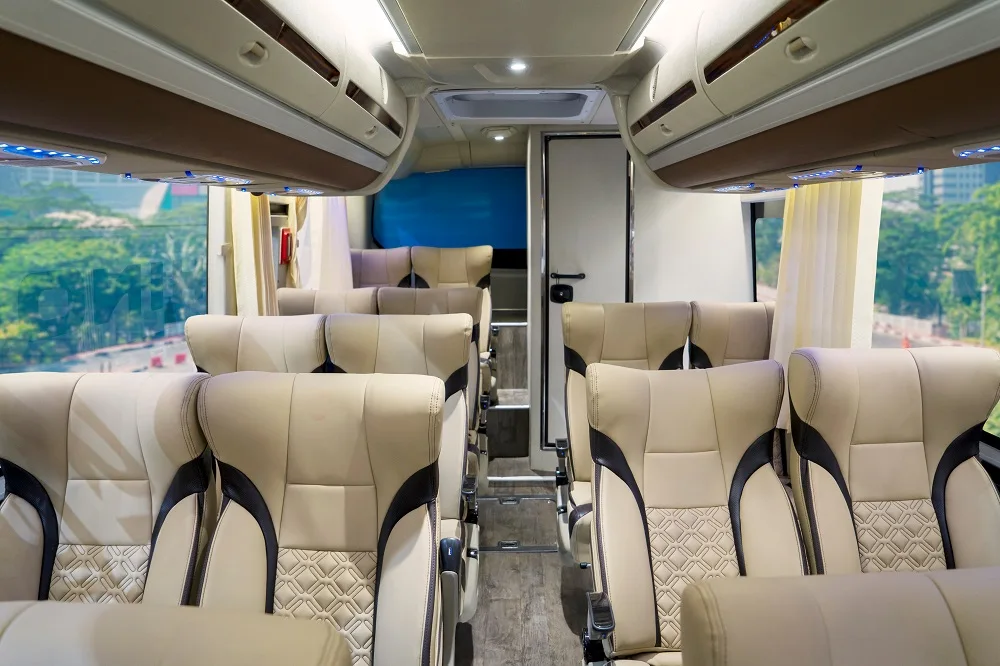Planning a standout event in vibrant Chicago requires meticulous logistical orchestration. Chicago venues cater to corporate gatherings and private events, with diverse event services. Mastering event logistics, from securing the perfect venue to navigating transportation, creates seamless and memorable experiences. This guide offers a 5 Cs framework to navigate complexities.
Local experts in Chicago help create memorable experiences for any event. For reliable special event transportation, choose Ideal Charter Bus.

What Is Event Logistics and Why Does It Matter?
Event logistics is the comprehensive management of all elements required to execute successful gatherings. It encompasses unique venue selection, transportation, equipment, and timeline coordination while balancing budgets and vendor relationships, with event management and vendor management as key components.
Event planners and event organizers in this field orchestrate both visible components like decor and catering alongside behind-the-scenes essentials such as permits, security, and communication systems. This meticulous event planning transforms concepts into reality while preventing potential issues before they impact attendee experiences.
Use the 5 Cs Framework to Streamline Your Event Planning
Event professionals often organize event planning efforts around five key phases — commonly called the 5 Cs. While the names may vary, the underlying logic remains consistent: you progress from defining your vision to gathering insights that fuel continuous improvement. It is essential to start planning early to achieve your event objectives and overall success, as careful attention to details at every stage is crucial.
1. Concept: Laying the Strategic Groundwork
Set specific, measurable goals (participation rates, lead numbers, satisfaction scores) rather than vague objectives, ensuring they align with your overall business strategy. Understand your audience by creating detailed personas that capture their needs, preferences, and pain points. Structure your special event like a story — from pre-event buildup through peak content delivery to meaningful conclusion — ensuring all decisions support this narrative and drive tangible outcomes.
2. Coordination: From Vision to Blueprint
Build a diverse team with clearly defined roles (Producer, Logistics Manager, Tech Lead, Onsite Coordinator) and leverage collaborative workshops to foster alignment. Create a detailed timeline showing critical paths, lead times, and key milestones, and use project management tools to track progress in real time. Thoroughly vet venues (access, power, Wi-Fi) and secure comprehensive vendor contracts with clear deliverables, cancellation terms, and insurance requirements to mitigate risk.
3. Control: Sustaining Momentum

Schedule regular team check-ins — weekly in early phases, daily as the event nears — to maintain focus and accountability. Create a centralized communication system with dedicated channels for updates, urgent issues, and resource sharing, complemented by real-time dashboards for visibility. Implement proactive risk management by documenting potential problems, assessing their likelihood and impact, developing specific mitigation strategies, and assigning team members to monitor each risk.
4. Culmination: The Event Execution
Create a detailed timeline with technical checks and session transitions, but remain flexible to adapt on the fly. Before opening, audit the venue from an attendee’s perspective — examining sights, sounds, comfort, and traffic flow — to guarantee a seamless experience. Designate staff to handle technical issues, attendee concerns, and vendor problems swiftly. Incorporate interactive elements like real-time polling, social displays, and structured networking opportunities to enhance engagement and satisfaction.
5. Closeout: Capturing Lessons and Cementing Relationships
Hold a thorough debrief within a week to review successes and improvement areas, capturing insights while they’re fresh. Gather meaningful feedback through targeted surveys, engagement metrics, and financial analysis to evaluate ROI. Strengthen relationships with personalized thank-you messages — sending attendees useful resources, acknowledging speakers and sponsors with custom recognition, and rewarding exceptional staff performance — to inform future editions and drive continuous improvement.
Ensure the Essential Components of Event Logistics
Successful events in Chicago require careful coordination by event planners and event organizers to select the right venue for corporate meetings, corporate events, and special events. Managing event logistics, technology, catering, and transportation is critical for participant experience. Effective event management and vendor management, collaborating with local experts and local vendors for AV equipment, event services, transportation logistics, and public transportation, ensures efficiency. Careful event planning, reviewing contracts, developing event schedules and backup plans, and managing costs ensures a seamless and memorable occasion, even within a tight budget, prioritizing memorable attendee experiences.
Right Venue Selection
The venue serves as the heart of any event. It should align with the event’s purpose, comfortably accommodate all attendees, and fit within budget constraints. Accessibility for guests and suppliers is crucial, as is clarity on in-house services (such as catering and AV) versus the need to engage external partners. High-quality photos showcasing the space, ideally lit with Chicago holiday lights, can also boost marketing efforts and generate excitement among attendees..
Catering & Food and Beverages Experience
Food and beverages often define the attendee experience. A tailored menu — whether a formal plated dinner or informal grazing stations — encourages networking and enhances the event’s atmosphere. Thoughtful presentation of bite-sized items promotes mingling, while eco-friendly choices and waste-minimization strategies demonstrate sustainability.

Technology & AV Infrastructure
Reliable AV and connectivity are non-negotiable. Equipment for livestreaming, presentations, lighting, and sound should be selected for performance and tested thoroughly in advance. Dedicated communication tools (tablets, radios) empower on-site teams to address technical issues in real time, ensuring a glitch-free experience.
Organization & Communication
Effective coordination resembles an air-traffic control system. Clear role definitions, centralized project-management platforms, and a single point of contact streamline collaboration among the internal team, venue staff, and external vendors. Regular status updates and open communication channels prevent misunderstandings and keep everyone aligned.
Transportation & Route Planning
At our transportation company, we manage guest and equipment movements with precision. When event planners evaluate the best charter bus companies, they look for reliability, route-planning efficiency, and on-time performance — all essential for smooth event execution. Advanced route-planning tools identify optimal paths, avoid congestion, and synchronize arrival times. Whether arranging shuttle services or coordinating freight deliveries, this proactive approach minimizes delays and maintains a smooth flow throughout the event.
Timeline Development
A detailed roadmap outlines every milestone — from registration opening to final teardown. Key deadlines for vendor confirmations, marketing launches, and technical rehearsals help track progress. Ongoing monitoring allows for early detection of potential bottlenecks, enabling swift adjustments to keep the event timeline on track.
Tackle 5 Event Logistics Challenges that Could Derail Your Event

Every successful event rests on more than just a great venue or engaging speakers — it requires anticipating the roadblocks that can spring up at any moment. From technical hiccups and budget pressures to unhappy sponsors and lackluster attendee experiences, a proactive approach will keep you — and your guests — on track. Below are the key areas to address before the big day.
Insufficient Technical Expertise
Build a specialized tech support team to manage complex event platforms. Run platform walkthroughs for speakers, stress-test every feature, and rehearse troubleshooting scenarios to ensure smooth virtual or hybrid sessions.
Budget Overruns
Allocate a 10–15% cushion above your projected expenses and enforce value-based spending reviews. If a line item offers little ROI, push back and show how it would jeopardize the overall budget.
Lack of Contingency Plans
Identify potential disruptions — speaker no-shows, bad weather, vendor delays — and draft backup strategies for each. Treat contingency planning as iterative: test your alternatives, refine them after each event, and keep them up to date.
Sponsor Dissatisfaction
Spell out sponsorship deliverables using concrete metrics (e.g., expected attendee reach, average sign-up rates, post-event social impressions). If outcomes fall short, offer compensatory post-event marketing boosts or bonus exposure.
Underwhelming Attendee Experience
Infuse interactive elements — virtual lounges, live entertainment, breakout rooms, photo booths — to replicate in-person engagement. These experiential features foster networking and keep both on-site and remote guests actively involved.
Partner with Ideal Charter Bus for Your Smooth Event Transportation
Successfully managing event logistics in a dynamic location like Chicago is an ongoing learning process. By understanding the core elements and proactively addressing potential challenges, you can transform intricate plans into flawlessly executed events. Remember that reflecting on each event, both successes and areas for improvement, is crucial for continuous growth.
For stress-free guest and vendor transit in Chicago, explore the flexible bus rental options at Ideal Charter Bus and ensure everyone arrives smoothly! Reach out to our bus rental company today!
Ready to Book Your Church Retreat Transportation?
Let us handle the driving while you focus on creating a meaningful spiritual experience. Serving the greater Chicago area with reliable, comfortable group transportation.







